我是无名之辈(翻译小诗305)15年12月9日
“我是无名之辈”
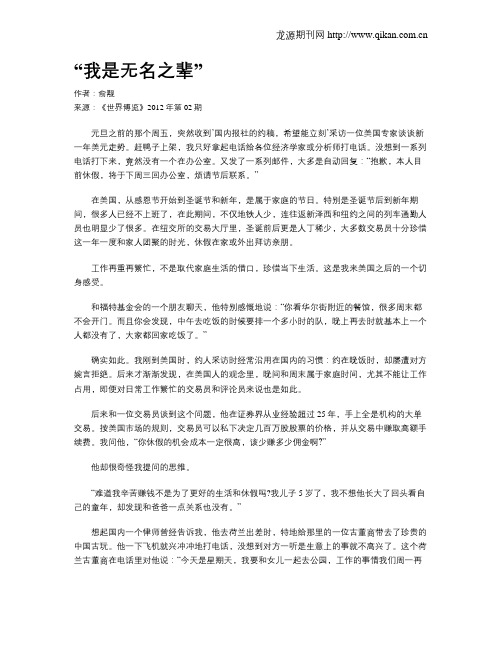
“我是无名之辈”作者:俞觏来源:《世界博览》2012年第02期元旦之前的那个周五,突然收到’国内报社的约稿,希望能立刻’采访一位美国专家谈谈新一年美元走势。
赶鸭子上架,我只好拿起电话给各位经济学家或分析师打电话。
没想到一系列电话打下来,竟然没有一个在办公室。
又发了一系列邮件,大多是自动回复:“抱歉,本人目前休假,将于下周三回办公室,烦请节后联系。
”在美国,从感恩节开始到圣诞节和新年,是属于家庭的节日。
特别是圣诞节后到新年期间,很多人已经不上班了,在此期间,不仅地铁人少,连往返新泽西和纽约之间的列车通勤人员也明显少了很多。
在纽交所的交易大厅里,圣诞前后更是人丁稀少,大多数交易员十分珍惜这一年一度和家人团聚的时光,休假在家或外出拜访亲朋。
工作再重再繁忙,不是取代家庭生活的借口,珍惜当下生活。
这是我来美国之后的一个切身感受。
和福特基金会的一个朋友聊天,他特别感慨地说:“你看华尔街附近的餐馆,很多周末都不会开门。
而且你会发现,中午去吃饭的时候要排一个多小时的队,晚上再去时就基本上一个人都没有了,大家都回家吃饭了。
”确实如此。
我刚到美国时,约人采访时经常沿用在国内的习惯:约在晚饭时,却屡遭对方婉言拒绝。
后来才渐渐发现,在美国人的观念里,晚间和周末属于家庭时间,尤其不能让工作占用,即便对日常工作繁忙的交易员和评论员来说也是如此。
后来和一位交易员谈到这个问题,他在证券界从业经验超过25年,手上全是机构的大单交易。
按美国市场的规则,交易员可以私下决定几百万股股票的价格,并从交易中赚取高额手续费。
我问他,“你休假的机会成本一定很高,该少赚多少佣金啊?”他却很奇怪我提问的思维。
“难道我辛苦赚钱不是为了更好的生活和休假吗?我儿子5岁了,我不想他长大了回头看自己的童年,却发现和爸爸一点关系也没有。
”想起国内一个律师曾经告诉我,他去荷兰出差时,特地给那里的一位古董商带去了珍贵的中国古玩。
他一下飞机就兴冲冲地打电话,没想到对方一听是生意上的事就不高兴了。
鉴赏艾米丽·迪金森的《我是无名之辈.你是谁?》
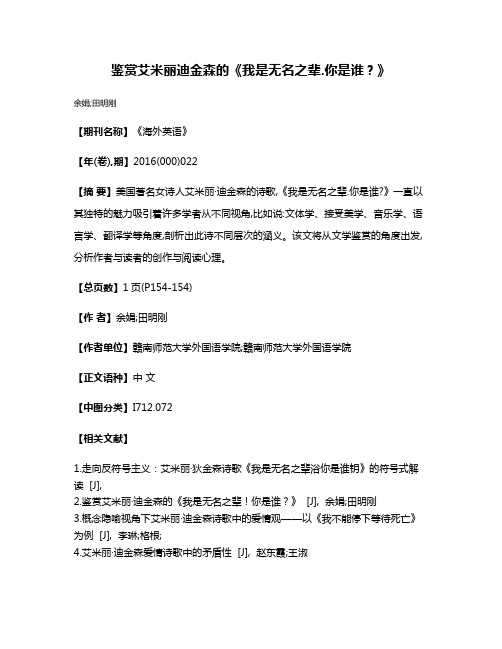
鉴赏艾米丽迪金森的《我是无名之辈.你是谁?》
余娟;田明刚
【期刊名称】《海外英语》
【年(卷),期】2016(000)022
【摘要】美国著名女诗人艾米丽·迪金森的诗歌,《我是无名之辈.你是谁?》一直以其独特的魅力吸引着许多学者从不同视角,比如说:文体学、接受美学、音乐学、语言学、翻译学等角度,剖析出此诗不同层次的涵义。
该文将从文学鉴赏的角度出发,分析作者与读者的创作与阅读心理。
【总页数】1页(P154-154)
【作者】余娟;田明刚
【作者单位】赣南师范大学外国语学院;赣南师范大学外国语学院
【正文语种】中文
【中图分类】I712.072
【相关文献】
1.走向反符号主义:艾米丽·狄金森诗歌《我是无名之辈浴你是谁钥》的符号式解读 [J],
2.鉴赏艾米丽·迪金森的《我是无名之辈!你是谁?》 [J], 余娟;田明刚
3.概念隐喻视角下艾米丽·迪金森诗歌中的爱情观——以《我不能停下等待死亡》为例 [J], 李琳;格根;
4.艾米丽·迪金森爱情诗歌中的矛盾性 [J], 赵东霞;王淑
5.从艾米丽·迪金森的诗歌 A narrow Fellow in the Grass 看前景化的翻译 [J], 张云丹
因版权原因,仅展示原文概要,查看原文内容请购买。
走向反符号主义:艾米丽 狄金森诗歌《我是无名之辈!你是谁?》的符号式解读
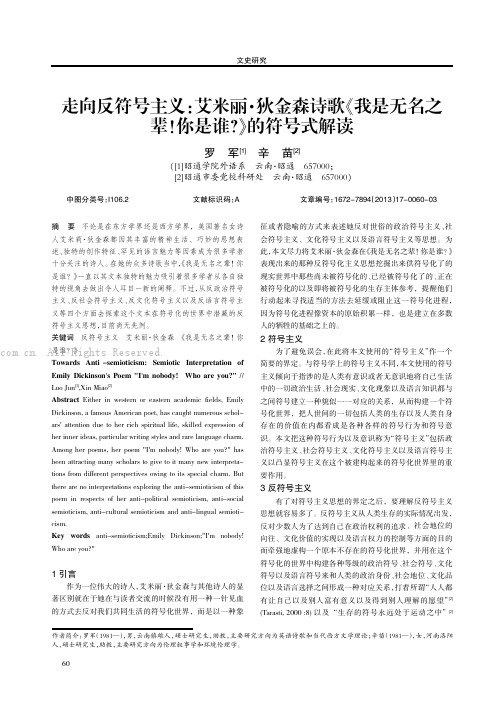
走向反符号主义:艾米丽·狄金森诗歌《我是无名之辈!你是谁?》的符号式解读罗军[1]辛苗[2]([1]昭通学院外语系云南·昭通657000;[2]昭通市委党校科研处云南·昭通657000)中图分类号:I106.2文献标识码:A文章编号:1672-7894(2013)17-0060-03摘要不论是在东方学界还是西方学界,美国著名女诗人艾米莉·狄金森都因其丰富的精神生活、巧妙的思想表述、独特的创作特征、罕见的语言魅力等因素成为很多学者十分关注的诗人。
在她的众多诗歌当中,《我是无名之辈!你是谁?》一直以其文本独特的魅力吸引着很多学者从各自独特的视角去做出令人耳目一新的阐释。
不过,从反政治符号主义、反社会符号主义、反文化符号主义以及反语言符号主义等四个方面去探索这个文本在符号化的世界中潜藏的反符号主义思想,目前尚无先例。
关键词反符号主义艾米丽·狄金森《我是无名之辈!你是谁?》Towards Anti-semioticism:Semiotic Interpretation of Emily Dickinson's Poem"I'm nobody!Who are you?"// Luo Jun[1],Xin Miao[2]Abstract Either in western or eastern academic fields,Emily Dickinson,a famous American poet,has caught numerous schol-ars'attention due to her rich spiritual life,skilled expression of her inner ideas,particular writing styles and rare language charm. Among her poems,her poem"I'm nobody!Who are you?"has been attracting many scholars to give to it many new interpreta-tions from different perspectives owing to its special charm.But there are no interpretations exploring the anti-semioticism of this poem in respects of her anti-political semioticism,anti-social semioticism,anti-cultural semioticism and anti-lingual semioti-cism.Key words anti-semioticism;Emily Dickinson;"I'm nobody! Who are you?"1引言作为一位伟大的诗人,艾米丽·狄金森与其他诗人的显著区别就在于她在与读者交流的时候没有用一种一针见血的方式去反对我们共同生活的符号化世界,而是以一种象征或者隐喻的方式来表述她反对世俗的政治符号主义、社会符号主义、文化符号主义以及语言符号主义等思想。
诗歌翻译

When you are old When you are old and grey and full of sleep, And nodding by the fire, take down this book, And slowly read, and dream of the soft look Your eyes had once, and of their shadows deep; How many loved your moments of glad grace, And loved your beauty with love false or true, But one man loved the pilgrim Soul in you, And loved the sorrows of your changing face; And bending down beside the glowing bars, Murmur, a little sadly, how Love fled And paced upon the mountains overhead And hid his face amid a crowd of stars.
並且俯身紅光閃閃的欄柵邊, 帶點哀傷,喃喃低語,愛怎樣 逃逸,逡巡於頭頂的高山上 且將他的臉隱匿於群星之間。
古之成大事业者,大学问者,必经过三种境界
咋夜西风凋碧树, Last night the western breeze blew withered leaves off trees. 独上高楼, I mount the tower high and strain my long eye. 望尽天涯路。
iam nobody
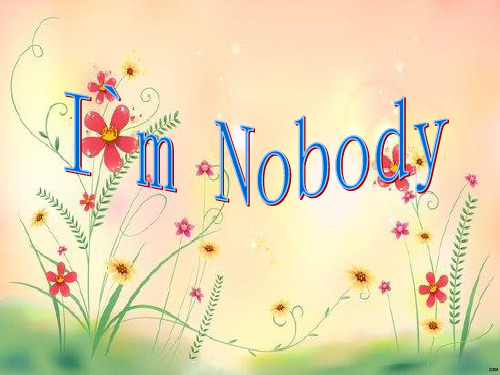
Summary The poem is composed of two quatrains, and, with an exception of the first line, the rhythm alternates between iambic tetrameter and iambic trimeter. The poem employs alliteration, anaphora, simile, satire, and internal rhyme but no regular end rhyme scheme. However, lines 1 and 2 and lines 6 and 8 end withmasculine rhymes. The poet incorporates the pronouns you, we, us, your into the poem, and in doing so, draws the reader into the piece. The poem suggests anonymity is preferable to fame. The poem was first published in 1891 in Poems, Series 2, a collection of Dickinson’s poems assembled and edited by Mabel Loomis Todd and Thomas Wentworth Higginson.
那咱俩就成了一对-----别出声!
They'd banish us, you know.
他们会把咱们排挤-要小心!
Alliteration
How dreary to be somebody!
emilydickinson诗歌赏析

①I’m Nobody!我是无名之辈-Emily DickinsonI’m nobody! Who are you我是无名之辈!你是谁Are you nobody, too你也是无名之辈吗Then there’s a pair of us----don’t tell!那么我们就是一对儿了!千万不要透露出去They’d banish us, you know!不然我们都会被他们驱逐,你知道。
How dreary to be somebody!做一个某某,是多么沉闷无聊How public, like a frog众人像是青蛙To tell your name the livelong day整日地把你谈论啊To an admiring bog!对着他们倾慕的泥沼我是无名之辈艾米莉·狄金森我是无名之辈,你是谁你,也是,无名之辈这就凑成一双,别声张!你知道,他们会大肆张扬!做个,显要人物,好不无聊!像个青蛙,向仰慕的泥沼——在整个六月,把个人的姓名聒噪——何等招摇!This poem is Dickinson’s most famous and most defense of the kind of spiritual privacy she favored, implying that to be a Nobody is a luxury incomprehensible to a dreary somebody—for they are too busy keeping their names in circulation. But to be somebody is not as fancy as it seems to be.Emily DickinsonAs you probably noticed when you read this poem, none of the themes that I discussed in the Overview of Dickinson applies to this poem. My list was not meant to cover every topic Dickinson wrote on, nor does every poem she wrote fit neatly into a category.Dickinson adopts the persona of a child who is open, naive, and innocent. However, are the questions asked and the final statement made by this poem naive If they are not, then the poem is ironic because of the discrepancy between the persona's understanding and view and those of Dickinson and the reader. Under the guise of the child's accepting society's values, is Dickinson really rejecting those valuesIs Dickinson suggesting that the true somebody is really the "nobody" The child-speaker welcomes the person who honestly identifies herself and who has a true identity. These qualities make that person "nobody" in society's eyes. To be "somebody" is to have status in society; society, the majority, excludes or rejects those who lack status or are "nobody"--that is, "they'd banish us" for being nobody.In stanza 2, the child-speaker rejects the role of "somebody" ("How dreary"). The frog comparison depicts "somebody" as self-important and constantly self-promoting. She also shows the false values of a society (the "admiring bog") which approves the frog-somebody. Does the word "bog" (it means wet, spongy ground) have positive or negative connotations What qualities are associated with the sounds a frog makes (croaking)Is there satire in this poemSome readers, who are modest and self-effacing or who lack confidence, feel validated by this poem. Why②To Make a Prairie…To make a prairieIt takes a clover and one bee,One clover and a bee,And revery.Revery alone will do,If bees are few.去造一个草原张祈试译去造一个草原需要一株三叶草和一只蜜蜂,一株三叶草和一只蜜蜂,还有梦。
佚名自嘲诗
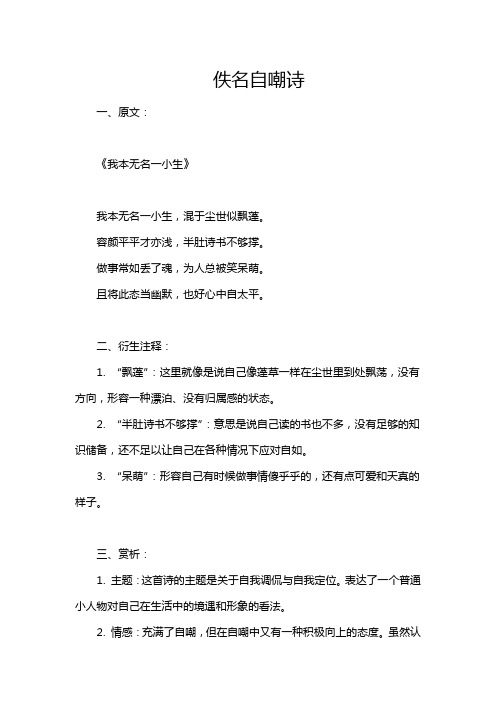
佚名自嘲诗一、原文:《我本无名一小生》我本无名一小生,混于尘世似飘蓬。
容颜平平才亦浅,半肚诗书不够撑。
做事常如丢了魂,为人总被笑呆萌。
且将此态当幽默,也好心中自太平。
二、衍生注释:1. “飘蓬”:这里就像是说自己像蓬草一样在尘世里到处飘荡,没有方向,形容一种漂泊、没有归属感的状态。
2. “半肚诗书不够撑”:意思是说自己读的书也不多,没有足够的知识储备,还不足以让自己在各种情况下应对自如。
3. “呆萌”:形容自己有时候做事情傻乎乎的,还有点可爱和天真的样子。
三、赏析:1. 主题:这首诗的主题是关于自我调侃与自我定位。
表达了一个普通小人物对自己在生活中的境遇和形象的看法。
2. 情感:充满了自嘲,但在自嘲中又有一种积极向上的态度。
虽然认识到自己的平凡、能力不足、做事迷糊等问题,却没有一味地沮丧,而是选择用一种幽默的方式来接受。
3. 表现手法:通过直接描写自己的外貌平平、才学浅薄、做事迷糊等特点,直白而生动。
而且巧妙地运用了一些具有画面感的词汇,如“飘蓬”。
最后一句的“且将此态当幽默,也好心中自太平”是一种自我的心理调适,将原本可能消极的自嘲转化为一种让内心平静、乐观的态度。
四、作者介绍:由于是佚名作品,从诗歌内容来看,作者应该是一个自我认知比较清晰,心胸豁达的普通人。
也许在生活中经常遇到一些小挫折或者被人调侃自己的小毛病,但有很强的自我调侃能力,能用幽默化解尴尬,在平凡的生活中寻求内心的平静。
五、运用片段:1. 假设在办公室里,大家都在谈论最近一次的业务考核结果。
有个同事打趣说:“唉,这次考核发现自己知道的东西太少了,真像诗里说的‘半肚诗书不够撑’呀,我这就像诗里那佚名说的,我本无名一小生,没什么厉害的才艺。
不过算了,就像诗里最后说的‘且将此态当幽默,也好心中自太平’,想开点就好啦。
”2. 在朋友聚会的时候,大家互相分享自己在生活中的窘事。
有人说:“我给你们说啊,我这人脸盲还迷糊。
上次见一个认识的人,我完全没认出来,感觉自己就像那诗里说的‘做事常如丢了魂,为人总被笑呆萌’的那个人。
我是无名之辈(翻译小诗305)15年12月9日
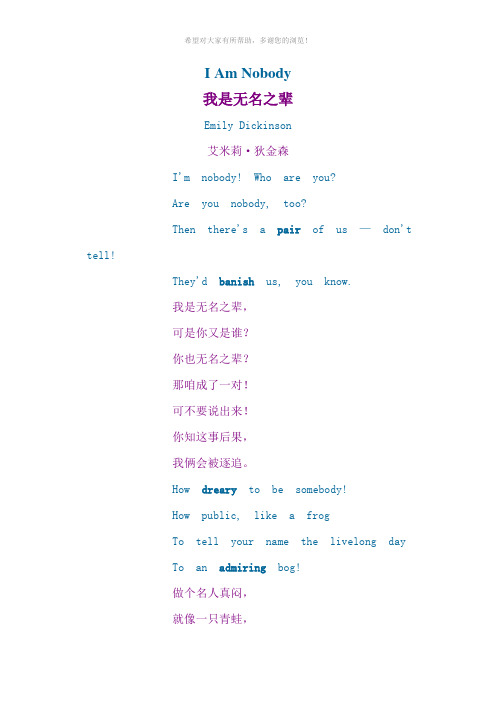
I Am Nobody
我是无名之辈
Emily Dickinson
艾米莉·狄金森
I'm nobody! Who are you?
Are you nobody, too?
Then there's a pair of us —don't tell!
They'd banish us, you know.
我是无名之辈,
可是你又是谁?
你也无名之辈?
那咱成了一对!
可不要说出来!
你知这事后果,
我俩会被逐追。
How dreary to be somebody!
How public, like a frog
To tell your name the livelong day
To an admiring bog!
做个名人真闷,
就像一只青蛙,
众目睽睽之下,
公开面对众人,
对着赞美泥塘,
整天不厌其烦,
述说自家姓名。
Translated into Chinese by Cissycissymary on Dec.9, 2015茜茜茜茜玛丽于2015年12日9日译成中文
希望对大家有所帮助,多谢您的浏览!(注:可编辑下载,若有不当之处,请指正,谢谢!)。
